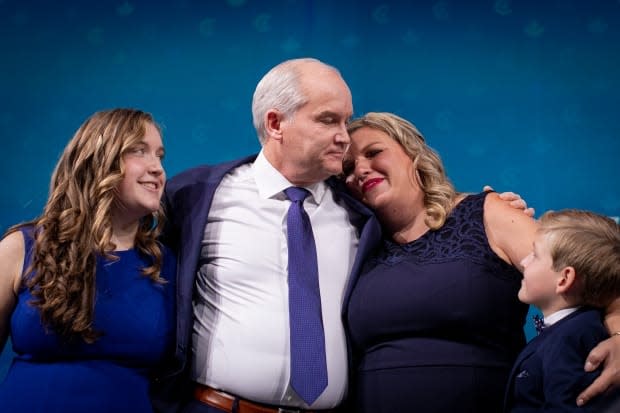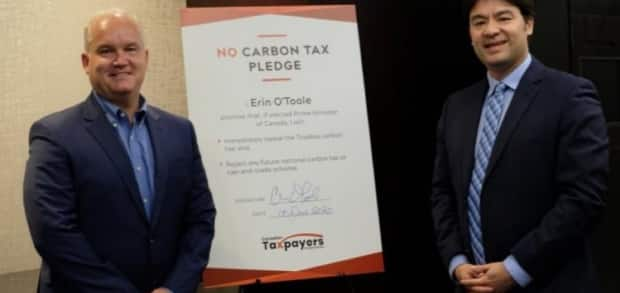Conservatives divided on what to do about Erin O'Toole after election loss

Conservative Leader Erin O'Toole's failure to end Justin Trudeau's government is inspiring some frustrated partisans to call for his replacement.
O'Toole promised to make inroads in the Greater Toronto Area and fell well short of the mark; the party actually lost seats in this vote-rich region. O'Toole's attempt to shift the party closer to the political centre also alienated some more right-wing small-c conservative supporters — some of whom voted for the People's Party of Canada (PPC).
Still, other party members seem to be more inclined to forgive O'Toole at this early stage of the election post-mortem process. They say they fear that dumping one Conservative leader for another at this point would only undermine the party's chances of defeating Trudeau or his Liberal successor in an election that could come in just two years' time.
There are some silver linings in the Conservatives' election performance. The party picked up seats in Atlantic Canada, brought down three of Trudeau's cabinet ministers, improved on past gains in Quebec and closed the vote gap significantly in Ontario, despite a rising PPC competing with the party on its right flank.
Andrew Brander is a long-time party organizer who served as chief of staff to former deputy Conservative leader Lisa Raitt. He said dumping O'Toole after just one election loss would set "a pretty dangerous precedent."
"This would be the second leader we've gotten rid of who's won the popular vote and a third of the seats in Parliament. Do we really want to be the party that says, 'No, that's not good enough and if you don't win, you only get one shot?'" Brander told CBC News.
"Is that really the standard we want to set for ourselves going forward?"
Brander said that while a win is obviously preferable to a loss, O'Toole did reasonably well with the little time he had to introduce himself to Canadians. O'Toole, who won the leadership last summer in the middle of the pandemic crisis, was essentially an unknown quantity before the start of this 36-day campaign.
"Six months ago, we would have been thrilled with the kind of numbers that we got on election night," Brander said, citing the party's bad poll numbers prior to the election call. "We were just 25 seats shy of a win. You flip those seats and the numbers are there for us to form a minority."
Brander also said a leadership race is "an exhausting process" that distracts from the business of contesting elections.
"From an insider and party perspective, they take a lot of time, money and resources that could be dedicated to building a war chest for the next election," Brander said.
Not everyone sees it that way. Bert Chen, a two-term member of the party's elected national council, has launched a petition and is collecting signatures from members to pressure the party to initiate a recall and try to oust O'Toole.
While that's never been done before, the Conservative constitution has some provisions that allow for non-binding referendums to survey the will of party members.
"The feedback I have gotten over the past several months, and further reinforced since Monday evening, is that Mr. O'Toole has failed as a leader," Chen told CBC News. As of Thursday afternoon, some 2,100 people had signed Chen's petition.

Chen said that, beyond the poor showing in Monday's vote, some party members feel betrayed by O'Toole — a man who presented himself as a "true blue" conservative in the party's leadership race only to abandon some of his promises on issues like carbon pricing, firearms and balanced budgets.
While fighting Peter MacKay for the top job, O'Toole said he was opposed to the Liberal government's carbon tax. Once elected leader, O'Toole reversed course and rolled out his "low-carbon savings account" proposal as part of his climate plan.
On guns, O'Toole promised firearms rights supporters that he'd scrap the Liberal assault-style weapons ban — only to shift his position during the general election when he faced some political heat. The Tory leader also proposed spending more even than Trudeau promised to spend in the next fiscal year, and pushed off the Conservative timeline for balancing the budget to a decade.
"I think Canadians want integrity and part of integrity is someone who keeps their promises and is consistent in those promises," Chen said.
"Conservatives have an even higher standard for integrity — we're the party behind the Accountability Act and all these reforms — and Conservatives feel that for a leader to change their positions, like what was done recently, it requires a review of that leader."

One Conservative caucus member who was highly critical of O'Toole's approach agreed it's a problem that O'Toole deviated so far from the promises he made during his leadership race in the general election.
"He campaigned as a Liberal. He wasn't even Liberal lite — he campaigned as a Liberal in this campaign with no input from caucus or the party or anybody else," the caucus member, speaking on a not-for-attribution basis, told CBC News.
The caucus member also said they and others were caught off guard by what was actually in the party's campaign platform.
'That risk did not pay off'
"I didn't even know what we were running on until I saw him on TV," the Conservative said of O'Toole's platform launch on day two of the campaign.
"Mr. O'Toole took a huge risk in this campaign by campaigning in the way that he did and that risk did not pay off. He needs to leave," the caucus member said, adding that the loss of urban and diverse MPs is "a huge concern."
"I'm just devastated that we lost those MPs that we did."
Beyond the prospect of a referendum, O'Toole faces a more immediate threat to his leadership.
Under the Reform Act, legislation drafted by Conservative MP Michael Chong and adopted by Parliament in 2015, the Conservative caucus could also prompt a leadership review.
At least 20 per cent of the caucus members must formally request such a review. If enough agree, a secret ballot vote is then held to decide the fate of the leader.
If a simple majority of members voted against O'Toole in such a process, an interim leader could be appointed and the party might be forced to launch a search for O'Toole's permanent successor.
Chen said he's reaching out to MPs to tell them their "constituents feel that Erin O'Toole failed and the only decision for you to make is to review his leadership."
Conservative sources close to O'Toole, speaking to CBC News on background, said the leader likely has enough caucus support to hang on if the Reform Act process is initiated by disgruntled MPs.
Some MPs — like Chong, who is considered a moderate — have publicly signalled their support for O'Toole. "We've laid the groundwork for victory," Chong said Tuesday.
Conservative MP Garnett Genuis, who comes from the social conservative wing of the party, said Conservatives should "stay united, defend our principles and remain focused on giving Canadians better government. We must learn the lessons of the election, share constructive feedback and remain united behind Erin O'Toole."
"There is no scenario in which another round of internal conflict or public navel gazing is going to be good for the country," the Alberta MP said in a Twitter post.
Melanie Paradis, O'Toole's director of strategic communications, said Wednesday a fractious battle over the leadership would only weaken the party's position in a minority Parliament.
"There is nothing the Liberals love more than Conservative infighting," she said. "We need to stay focused on bringing the fight to Trudeau and continuing to hold him to account."
If he can push off a caucus revolt, O'Toole faces another formal challenge to his position in 2023.
Under the party's constitution, there is an automatic leadership review at the first national Conservative convention "following a federal general election when the party does not form the government and the leader has not indicated, prior to the commencement of the national convention, an irrevocable intention to resign."
So if O'Toole does not resign before the planned 2023 convention, delegates will be asked to vote on whether they want to launch a "new leadership selection process" to replace him — but the scars from this campaign may have faded by the time members get a say.
O'Toole seemed to warn against such a move in his concession speech, saying Trudeau could prompt another election at any time and the party must be ready to fight him off.
"If Mr. Trudeau thinks he can threaten Canadians with another election in 18 months, the Conservative Party will be ready," he said.
"And whenever that day comes, I will be ready to lead Canada's Conservatives to victory."

